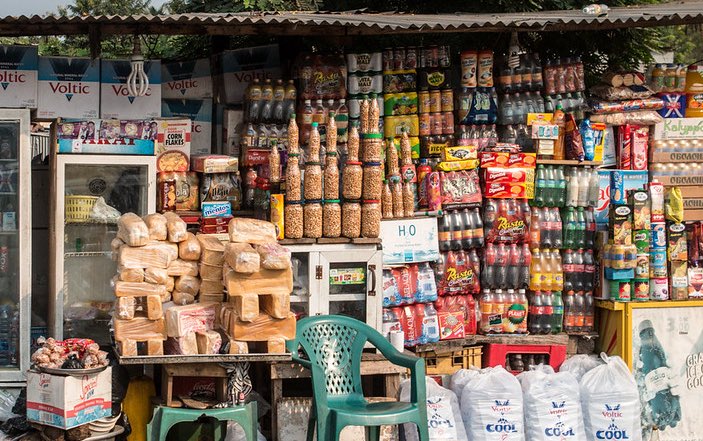In recent decades, economic growth in Africa south of the Sahara has proven to be a double-edged sword. Higher incomes have helped increase food consumption and reduced rates of undernutrition, though the gains from growth have been unequal; about 20% of Africans, or more than 250 million people, still go to bed hungry every day. At the same time, the prevalence of overweight and obesity is on the rise, in part because a significant share of increased food demand has gone into processed and ultra-processed foods and sugar-sweetened beverages. As a result, the region faces a massive problem of a double burden of malnutrition.
A recent study led by Thomas Reardon and Barry Popkin, and involving IFPRI researchers Bart Minten and Rob Vos and others, associates the emergence of the double burden with rapid changes in African food markets. With rapid urbanization, higher incomes, and employment opportunities for women, demand for convenient (processed) foods is expanding rapidly and supply chains have transformed—shifting production towards cheap processed foods and distribution through supermarkets and local convenience stores, mostly in urban areas.
Consumption of processed and ultra-processed food is also on the rise in Africa’s rural areas, driven, among other things, by mechanization of farm production, increased incomes from non-farm employment, and an associated increase in the opportunity cost of time and convenience. Many of the processed foods are high in sugar, salt, saturated fats and/or preservatives and thus contribute to overweight and the spread of non-communicable diseases such as diabetes, cardiovascular diseases, and cancer. Meanwhile, those left behind in economic development, including many smallholders and landless in rural areas affected by weather shocks and conflict, also face continued food insecurity and high rates of child stunting and wasting.
The rise in demand for processed foods has come on the back of rapid expansion of food processing and modern distribution and packaging systems in food supply chains, thanks to the proliferation of both small- and medium enterprises (SMEs) and large domestic and foreign food companies. These have also stimulated demand for (ultra-)processed foods through aggressive marketing campaigns and via the lower cost of such foods achieved through investments in economies of scale. Many of the larger players in Africa’s food market have expanded through foreign direct investment, such as from Indonesia’s Indofood, providing package snacks and ready-to-eat products like Indomie ramen noodles in Nigeria.
The emergence of the processed food sector has both positive and negative impacts. On the upside, the processed foods revolution is providing convenience to consumers in general, but especially for women, and is also generating significant numbers of new jobs, increasingly for women, along food supply chains. SMEs involved in processing, wholesale, transportation, and retail currently employ an estimated 20% of the rural and 25% of the urban workforces in Africa. Also, increased supply of some processed foods (like processed and packaged milk) has improved food safety and helped diversify diets, reducing undernourishment and micronutrient deficiency. On the downside, however, as already mentioned, the increased consumption of ultra-processed food has substantially pushed up the prevalence of overweight and obesity, increasing health risks in the form of diabetes, cardiovascular diseases and cancer.
Reversing trends that have been ongoing for decades will not be easy. Yet, the study suggests a number of interventions that have proven effective in several contexts. Cash transfers and subsidies for school feeding and scaling up nutrition-sensitive agriculture programs are direct ways to help the poor and reduce undernourishment in a targeted manner. Targeted public investments in public infrastructure (roads, electricity, storage capacity, etc.) will help improve access to markets for poor producers, integrate value chains and enhance food safety, generating better incomes and employment opportunities for poor farmers and rural workers. Such measures will also increase the availability and affordability of both fresh and processed foods. Further complementary measures will be needed to counter food system improvements that encourage the consumption of unhealthy processed foods. Fiscal policies and regulations, such as sugar taxes and the labeling of unhealthy foods, have been successfully applied to reduce demand for unhealthy ultra-processed foods. Chile, for instance, successfully reduced consumption by levying taxes on sugar-sweetened beverages and making front-of-package warning labels mandatory.
Replicating such policies in Africa may be challenging, as they may face strong opposition from large food companies with strong market power, and governments may lack the administrative capacities to implement them. In addition, certain measures, such as excise taxes on unhealthy products may be difficult to implement in contexts where processing and retail sectors are fragmented and dominated by informal sector SMEs, as is the case in Africa south of the Sahara. Chile’s experience with nutrient profiling of food items through highly visible front-of-package labeling could thus be a more feasible option for governments in Africa to consider. They could also learn from Chile’s and Mexico’s bans on unhealthy foods distributed in schools, and strongly regulate advertisements for (ultra-)processed foods. Such interventions will need to be tailored to the specific conditions of countries in Africa, and its political as well as industrial landscape. Failing to address Africa’s growing double malnutrition burden, however, will come at an enormous cost to health and human capital, which will over time will lead to significant economic setbacks.
Swati Malhotra is a Communications Specialist with IFPRI’s Markets, Trade, and Institutions Division (MTID); Rob Vos is Director of MTID.
This work was supported by the U.N. Food and Agriculture Organization (FAO), the Carolina Population Center NIH Center, Bloomberg Philanthropies, and the U.S. Agency for International Development.







